Length of time for lights
-
finchandlovebird
- Proven

- Posts: 2052
- Joined: Fri Sep 02, 2011 7:35 pm
- Location: Wisconsin
Length of time for lights
For a PET canary; how many hours a day should his cage light be on?
And for a single canary in a single cage; should he be covered at night?
And for a single canary in a single cage; should he be covered at night?
Dolly J
1 Canary, 1 Parakeet
Raised Gouldians & Scarlet Chested Parakeets in past years
1 Canary, 1 Parakeet
Raised Gouldians & Scarlet Chested Parakeets in past years
-
w.l.
- Incubating

- Posts: 900
- Joined: Wed Jul 09, 2014 10:41 pm
Re: Length of time for lights
12 hours/day should be fine if you want to keep it standard.
Covering is only necessary if the cage stands in a place where there's lots of disturbance at night, for example in a room where people watch TV etc.
It can also help protect the bird from mosquitos, if they are an issue there.
Covering is only necessary if the cage stands in a place where there's lots of disturbance at night, for example in a room where people watch TV etc.
It can also help protect the bird from mosquitos, if they are an issue there.
-
Sheather
- Proven

- Posts: 2299
- Joined: Thu Dec 12, 2013 7:49 pm
- Location: Northwest Indiana
Re: Length of time for lights
I recall that canaries need seasonal light variation to thrive, but I don't know how that works in the tropics as where w.l. is.
I kept my canaries until this year on 12 hour days through winter, then longer as summer came, and found males sang a lot less, and hens were always laying eggs. I now let the birds go to sleep at sunset and wake at sunrise and they're singing strongly and not trying to breed yet.
I kept my canaries until this year on 12 hour days through winter, then longer as summer came, and found males sang a lot less, and hens were always laying eggs. I now let the birds go to sleep at sunset and wake at sunrise and they're singing strongly and not trying to breed yet.
~Dylan
~~~
~~~
-
w.l.
- Incubating

- Posts: 900
- Joined: Wed Jul 09, 2014 10:41 pm
Re: Length of time for lights
European and North American birds need the seasonal changes in daylight hours, but canaries are so well domesticated that they don't seem to care much.
Here there are 12 hours of daylight all year-round and canaries breed like rabbits.
In North America and Europe, birds probably follow the outside daylight hours anyway, uless kept in some totally windowless room, or up in the Arctic where it's dark all day in winter.
Here there are 12 hours of daylight all year-round and canaries breed like rabbits.
In North America and Europe, birds probably follow the outside daylight hours anyway, uless kept in some totally windowless room, or up in the Arctic where it's dark all day in winter.
-
Sheather
- Proven

- Posts: 2299
- Joined: Thu Dec 12, 2013 7:49 pm
- Location: Northwest Indiana
-
w.l.
- Incubating

- Posts: 900
- Joined: Wed Jul 09, 2014 10:41 pm
Re: Length of time for lights
Don't know - I don't keep any!
If you really want to know, I can ask someone later.
If you really want to know, I can ask someone later.
-
Sheather
- Proven

- Posts: 2299
- Joined: Thu Dec 12, 2013 7:49 pm
- Location: Northwest Indiana
Re: Length of time for lights
I'm curious, I've heard from someone I used to know in Thailand that canaries there don't live very long because they get exhausted from the "endless summer".
~Dylan
~~~
~~~
-
w.l.
- Incubating

- Posts: 900
- Joined: Wed Jul 09, 2014 10:41 pm
Re: Length of time for lights
I have no idea how long they live here.
It may well be that their lifespan is shorter, and they get worn out faster.
That could also be because Indonesians don't have the concept of giving birds a rest after raising three nestfuls of chicks or so. When I recommend it, they ask with disdain: " How many days (!!!) or weeks should I let them rest?"
A friend of mine had said he believed me a rested his cut-throats after three unsuccessful clutches. But when I visited, I saw he had given them nest again.
I asked "Didn't you say you were giving them a rest?"
"They had already rested a month!" he answered.
But breed canaries certainly do here.
So much so that they can cost as little as $3-4.
It may well be that their lifespan is shorter, and they get worn out faster.
That could also be because Indonesians don't have the concept of giving birds a rest after raising three nestfuls of chicks or so. When I recommend it, they ask with disdain: " How many days (!!!) or weeks should I let them rest?"
A friend of mine had said he believed me a rested his cut-throats after three unsuccessful clutches. But when I visited, I saw he had given them nest again.
I asked "Didn't you say you were giving them a rest?"
"They had already rested a month!" he answered.
But breed canaries certainly do here.
So much so that they can cost as little as $3-4.
-
Dave
- Sisal Slave

- Posts: 564
- Joined: Mon Dec 14, 2015 7:24 am
- Location: Campbellsville, KY
Re: Length of time for lights
It's been established for decades that Canaries need seasonal day length changes. They get messed up hormonally if they are kept at 12 hours of light year around.
If your birds are indoors, counting on electric lights, you can just time your lights to come on when you want, and go off when you want. I knew a breeder that kept his birds dark until mid-morning or later, so that the lights would still be on when he got home from work. Still, he adjusted the length of time the lights were on to match the natural season.
Canaries naturally molt as the days start to get shorter (after June 21 in the Northern hemisphere). They are usually in full molt in August. The males start to sing after the molt, as the days continue to get shorter.
In the spring, as the days get longer, the hens will start laying eggs when the day length is somewhere around 13 or 13.5 hours.
Besides the length of the day, an increase in (protein and greens) PLUS an increase in temperature will also push hens into breeding condition. Good canary breederss use all three. In the summer, as the days shorten, and nutrition levels are cut a bit and the days get cooler, the hen will stop laying. I've never had a hen that didn't stop laying eggs.
Dave
If your birds are indoors, counting on electric lights, you can just time your lights to come on when you want, and go off when you want. I knew a breeder that kept his birds dark until mid-morning or later, so that the lights would still be on when he got home from work. Still, he adjusted the length of time the lights were on to match the natural season.
Canaries naturally molt as the days start to get shorter (after June 21 in the Northern hemisphere). They are usually in full molt in August. The males start to sing after the molt, as the days continue to get shorter.
In the spring, as the days get longer, the hens will start laying eggs when the day length is somewhere around 13 or 13.5 hours.
Besides the length of the day, an increase in (protein and greens) PLUS an increase in temperature will also push hens into breeding condition. Good canary breederss use all three. In the summer, as the days shorten, and nutrition levels are cut a bit and the days get cooler, the hen will stop laying. I've never had a hen that didn't stop laying eggs.
Dave
Dave
Campbellsville, Kentucky, USA
Canaries
Campbellsville, Kentucky, USA
Canaries
-
Sheather
- Proven

- Posts: 2299
- Joined: Thu Dec 12, 2013 7:49 pm
- Location: Northwest Indiana
Re: Length of time for lights
Yeah I'd recommend keeping a pet canary's light cycle as close to that of the outside as possible in a northern climate. This way they breed in spring, molt in summer, and sing all winter.
~Dylan
~~~
~~~
- Nipper06
- Novice Nester

- Posts: 446
- Joined: Thu Oct 04, 2007 10:49 pm
- Location: Wilmington, Delaware (USA)
Re: Length of time for lights
My Canary "Tweety" isn't tweeting (singing) so well this year. Earlier this year, I'd lengthened the time his lights were on - did this change likely throw him off schedule? Yesterday, I put his supplemental lighting back closer to nature, with lights coming on after sunrise and going off shortly after sunset. So his winter "day length" is now shorter, more like in nature. I am hoping this makes him sing again.
Last year, with shorter day length, he sang better - from mid-October on, he just kept singing. So I hoping this change works. Will report back soon!
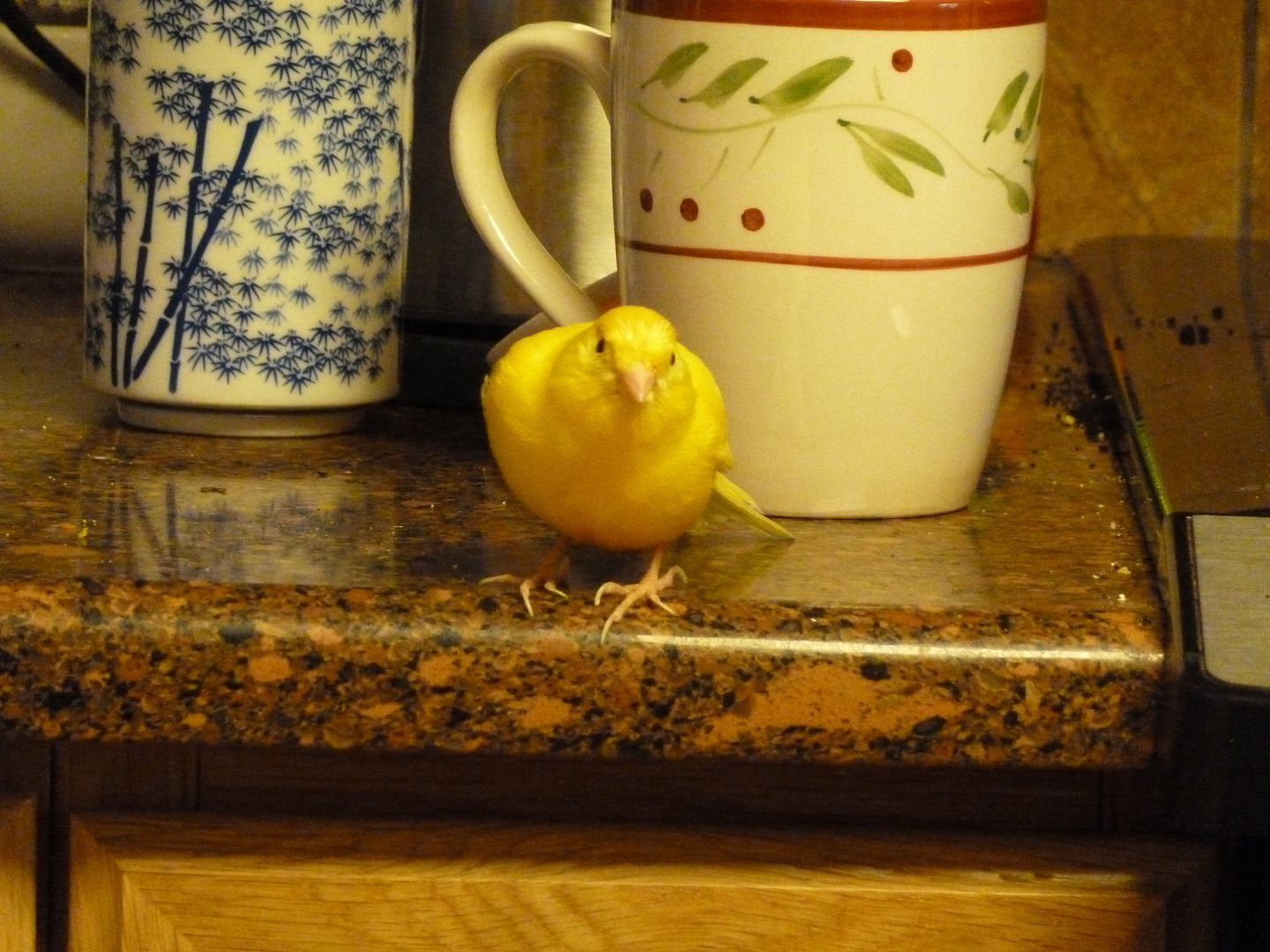
Last year, with shorter day length, he sang better - from mid-October on, he just kept singing. So I hoping this change works. Will report back soon!

Ron
My Pets: 2 Java Sparrows, 1 Canary, 4 Gouldian Finches, 1 Green Singer, 2 Ringneck Doves, 1 Budgie, 2 Rosy Bourke Parakeets, and 1 Mixed-breed Terrier
My Pets: 2 Java Sparrows, 1 Canary, 4 Gouldian Finches, 1 Green Singer, 2 Ringneck Doves, 1 Budgie, 2 Rosy Bourke Parakeets, and 1 Mixed-breed Terrier
- Paul's Amazing Birds
- Flirty Bird

- Posts: 227
- Joined: Sun Oct 18, 2015 4:41 pm
- Location: (SF/CA) paul.94949@gmail.com
Re: Length of time for lights
Totally agree with Dave and Dylan's post about canary light cycle etc.
RE: life span...my oldest red factor male is now 11. He is a show quality, soft feather male who came to me for free as part of a package deal about 5 years ago because he was blind in one eye. He was a great breeder for 3 more years until he went blind in the other eye. So now he's retired from the main aviary and living comfortably in a special apartment of his own close to my computer work station. Low perches, all the best foods and still my best singer - particularly when I play his favorites from the ITunes play list.
Paul
RE: life span...my oldest red factor male is now 11. He is a show quality, soft feather male who came to me for free as part of a package deal about 5 years ago because he was blind in one eye. He was a great breeder for 3 more years until he went blind in the other eye. So now he's retired from the main aviary and living comfortably in a special apartment of his own close to my computer work station. Low perches, all the best foods and still my best singer - particularly when I play his favorites from the ITunes play list.
Paul
Favorite hobby is continuing to improve on a landscaped, weather protected, 500 sq ft mixed aviary with 23 fascinating species. 30 years in the making; currently have
19 different Finch species, 2 types of Doves, plus 23 Button Quail and 30 pair of clear Red Factor Canaries.
19 different Finch species, 2 types of Doves, plus 23 Button Quail and 30 pair of clear Red Factor Canaries.
- Paul's Amazing Birds
- Flirty Bird

- Posts: 227
- Joined: Sun Oct 18, 2015 4:41 pm
- Location: (SF/CA) paul.94949@gmail.com
Re: Length of time for lights
Ron,
For Tweety, I would give him some high protein egg food treats, place his bath tub in direct sunlight during the day and play some pre-recorded canary songs from a CD you can buy on line. A girlfriend might also help his libido quite a bit.
P
For Tweety, I would give him some high protein egg food treats, place his bath tub in direct sunlight during the day and play some pre-recorded canary songs from a CD you can buy on line. A girlfriend might also help his libido quite a bit.
P
Favorite hobby is continuing to improve on a landscaped, weather protected, 500 sq ft mixed aviary with 23 fascinating species. 30 years in the making; currently have
19 different Finch species, 2 types of Doves, plus 23 Button Quail and 30 pair of clear Red Factor Canaries.
19 different Finch species, 2 types of Doves, plus 23 Button Quail and 30 pair of clear Red Factor Canaries.
- Nipper06
- Novice Nester

- Posts: 446
- Joined: Thu Oct 04, 2007 10:49 pm
- Location: Wilmington, Delaware (USA)
Re: Length of time for lights
Tweety already has all those things (egg food, treats, Canary CDs, bath tub) that you suggested - and I reduced his artificial lighting to follow natural day length - but he has no girlfriend. But I heard that a female can make them stop singing? Or is that only if they are in the same cage?
He's chirping a little more but he is still not really singing yet, like he was this time last year.
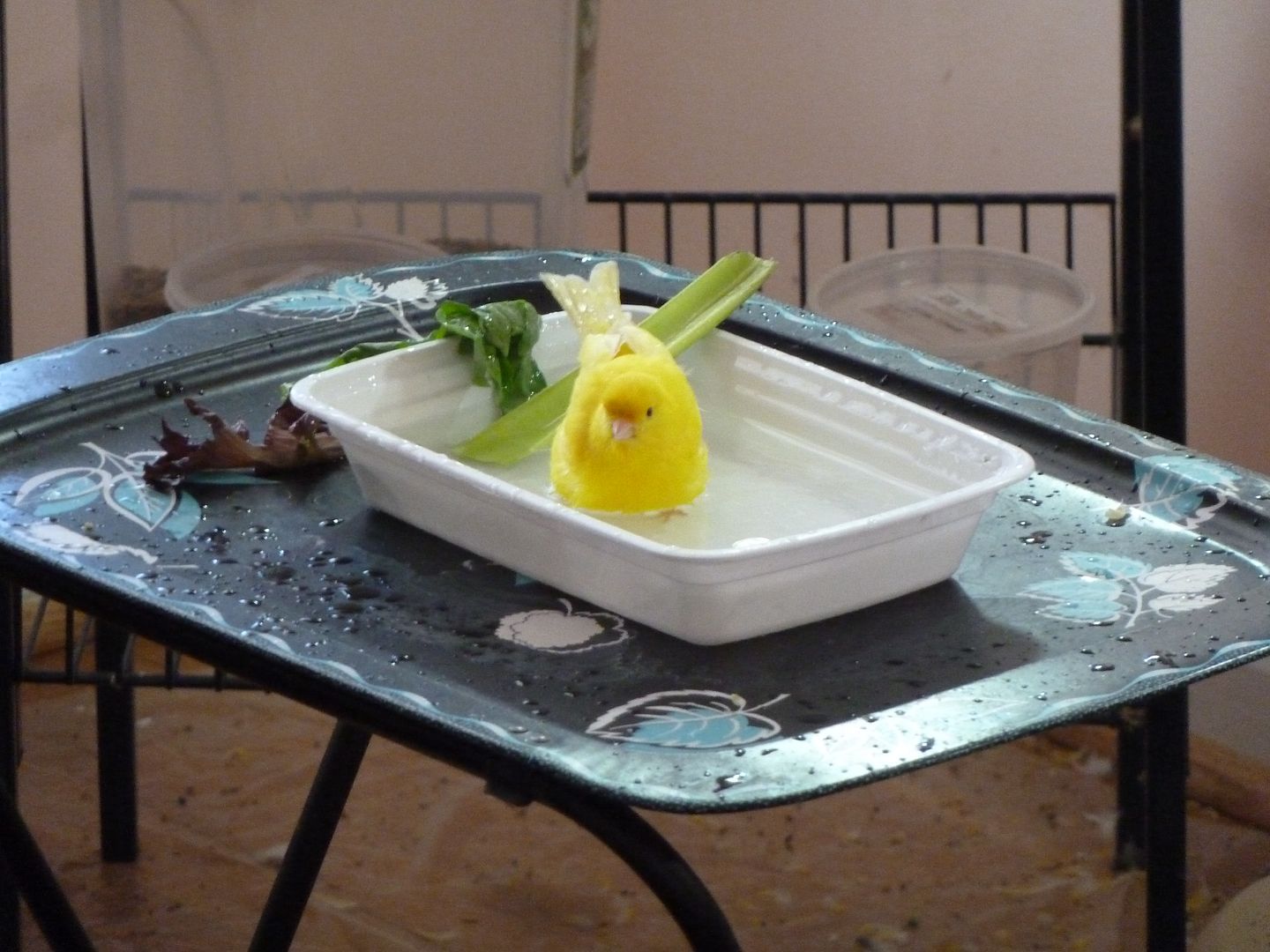
I give him his bath outside the cage so he doesn't make a mess.
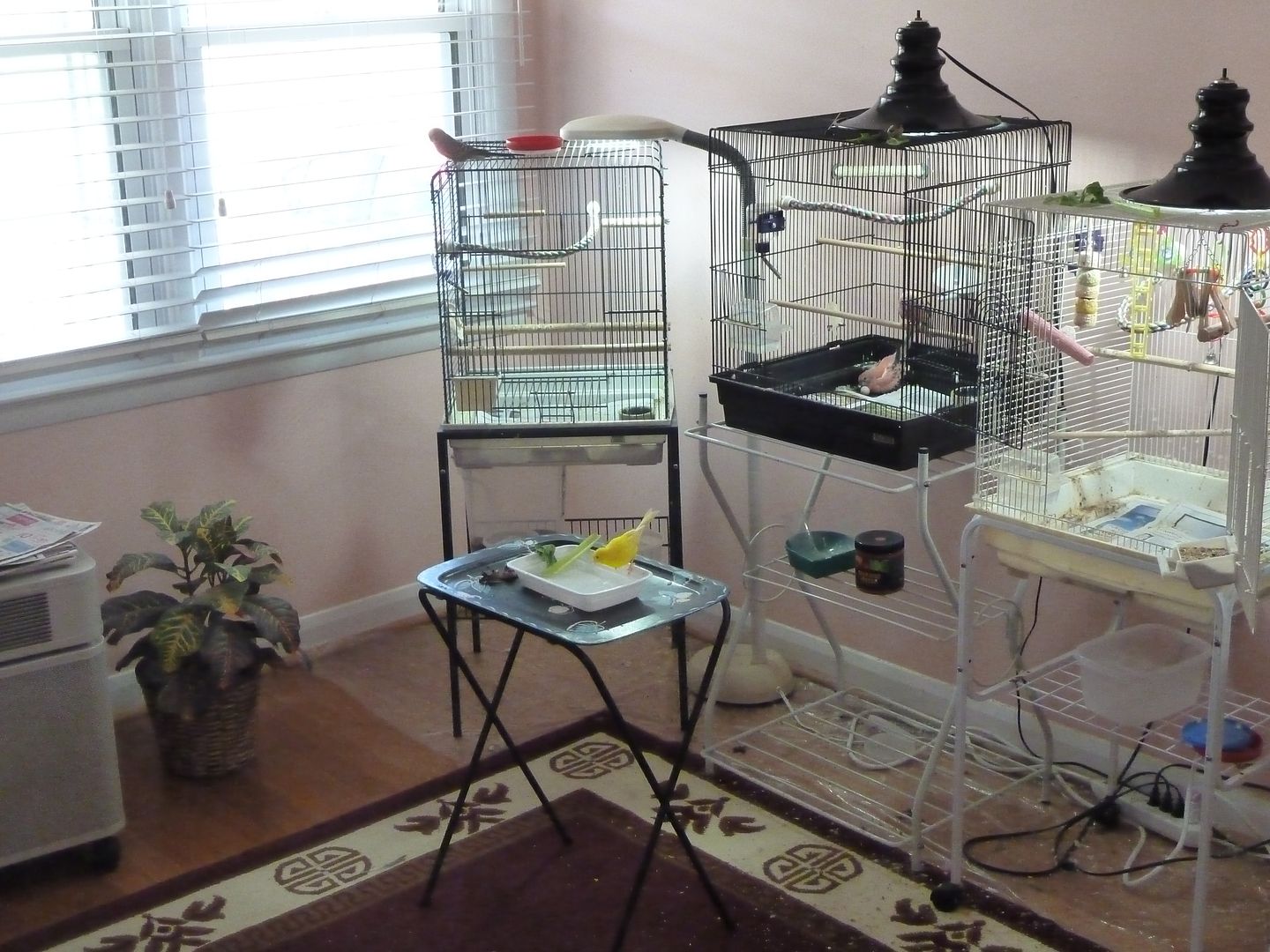
He does visit with his non-Canary neighbors
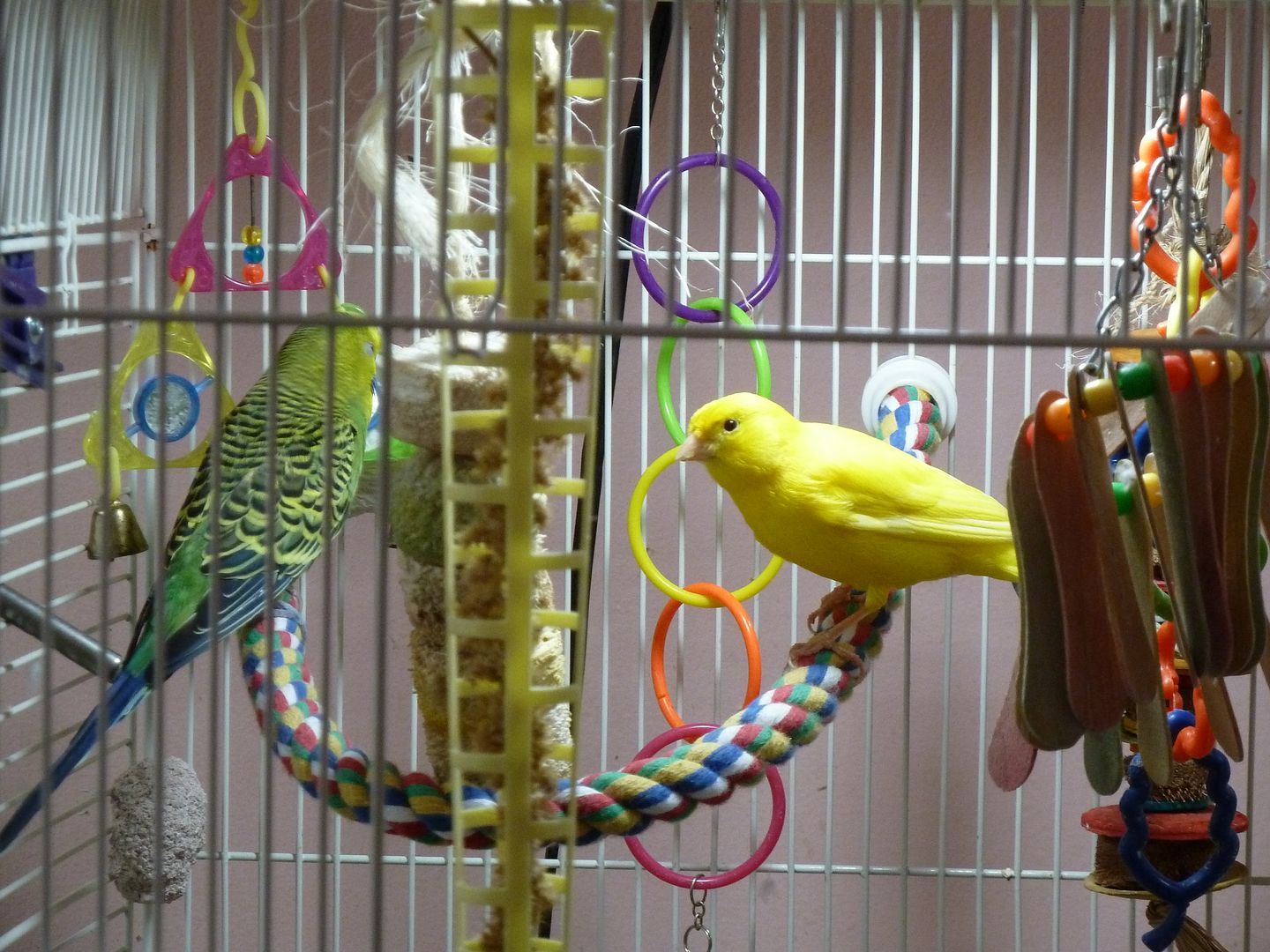
Gets lots of veggies, greens, and fresh egg-food
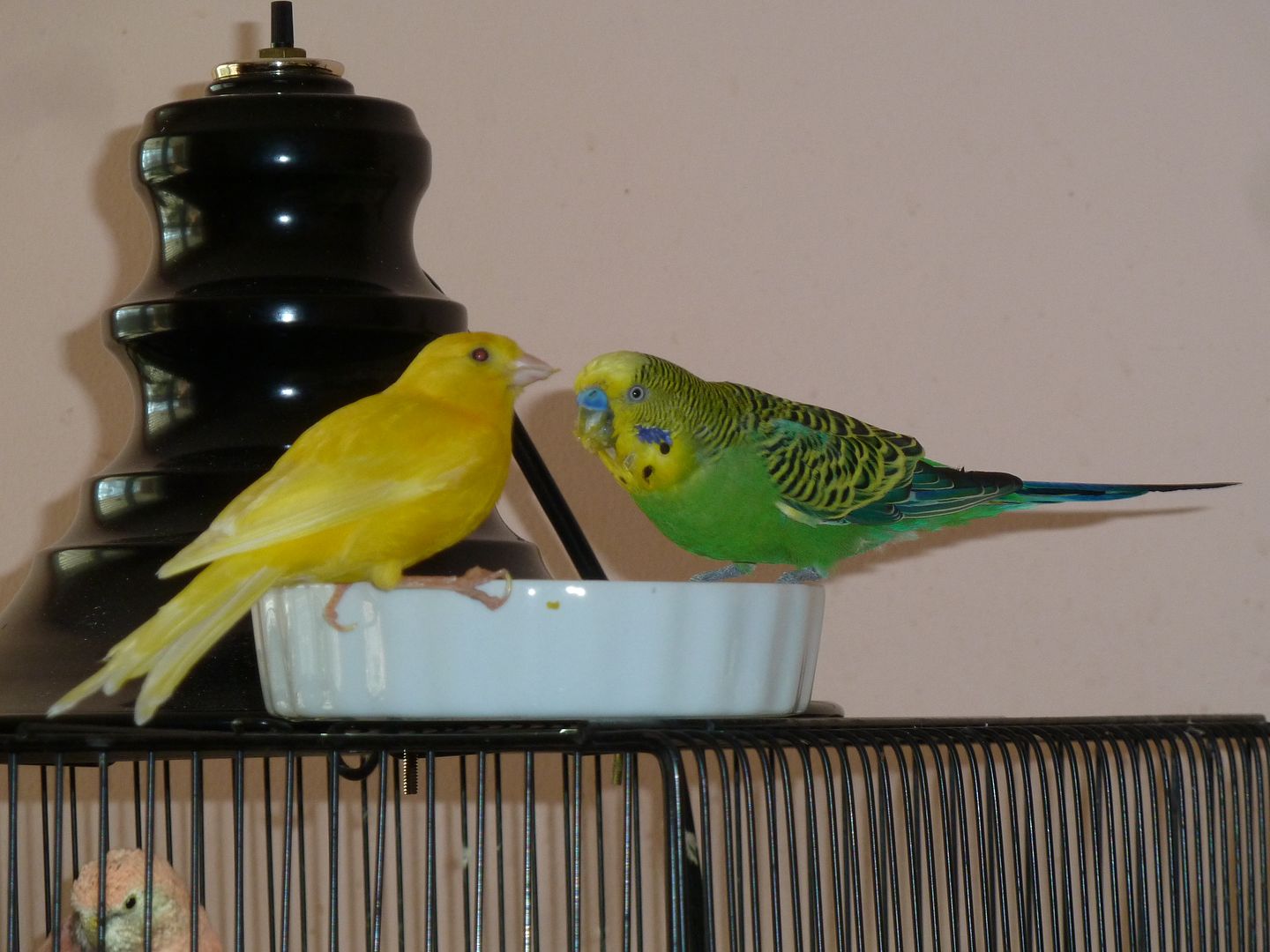
He's chirping a little more but he is still not really singing yet, like he was this time last year.

I give him his bath outside the cage so he doesn't make a mess.

He does visit with his non-Canary neighbors

Gets lots of veggies, greens, and fresh egg-food

Ron
My Pets: 2 Java Sparrows, 1 Canary, 4 Gouldian Finches, 1 Green Singer, 2 Ringneck Doves, 1 Budgie, 2 Rosy Bourke Parakeets, and 1 Mixed-breed Terrier
My Pets: 2 Java Sparrows, 1 Canary, 4 Gouldian Finches, 1 Green Singer, 2 Ringneck Doves, 1 Budgie, 2 Rosy Bourke Parakeets, and 1 Mixed-breed Terrier
- Paul's Amazing Birds
- Flirty Bird

- Posts: 227
- Joined: Sun Oct 18, 2015 4:41 pm
- Location: (SF/CA) paul.94949@gmail.com
Re: Length of time for lights
Pretty Birds, Ron! Very healthy too with all that flight space, I'm sure.
After no song at all... this time of year mine start singing softly at first, mostly to themselves through December. Then as the days start getting a little longer they sing louder and louder and start sparing with other males and chasing the hens around. I usually set my birds up in selective breeding cages in early March. They seem to prefer the privacy of the smaller apartments with plenty of egg food, nest material and private nest cups.
That whole process from courtship to nest building to fledglings is really fascinating. I've actually seen some males singing while mating. Also noticed that canaries like to bond and raise babies in pairs but they're not necessarily monogamous which is probably one of the best reasons I use selective breeding cages over an open breeding situation. Success rate is also much higher without any disturbances.
Paul
After no song at all... this time of year mine start singing softly at first, mostly to themselves through December. Then as the days start getting a little longer they sing louder and louder and start sparing with other males and chasing the hens around. I usually set my birds up in selective breeding cages in early March. They seem to prefer the privacy of the smaller apartments with plenty of egg food, nest material and private nest cups.
That whole process from courtship to nest building to fledglings is really fascinating. I've actually seen some males singing while mating. Also noticed that canaries like to bond and raise babies in pairs but they're not necessarily monogamous which is probably one of the best reasons I use selective breeding cages over an open breeding situation. Success rate is also much higher without any disturbances.
Paul
Favorite hobby is continuing to improve on a landscaped, weather protected, 500 sq ft mixed aviary with 23 fascinating species. 30 years in the making; currently have
19 different Finch species, 2 types of Doves, plus 23 Button Quail and 30 pair of clear Red Factor Canaries.
19 different Finch species, 2 types of Doves, plus 23 Button Quail and 30 pair of clear Red Factor Canaries.